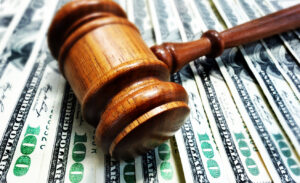
Economic damages are a major component of personal injury damages. In fact, they are one of the three types of damages that Georgia recognizes–economic, non-economic, and punitive damages.
Understanding economic damages can help you be prepared for what to expect in your personal injury case. Remember this much–if you can easily count them, they are probably economic damages.
Types of Economic Damages
You can divide economic damages into four main categories–medical expenses, lost earnings, out-of-pocket expenses, and future economic damages.
Medical Expenses
Medical expenses include anything you might pay a healthcare provider, with the possible exception of mental healthcare providers (which arguably might be better classified as non-economic damages).
Lost Earnings
Lost earnings means any income you would have earned (but didn’t) because of your injuries. You can claim lost earnings whether you are an employee or you are self-employed. You can even claim damages for lost sick leave and vacation time.
Out-of-Pocket Expenses
Out-of-pocket expenses are expenses that you must pay first and then seek reimbursement. These might include childcare expenses while you were in the hospital, house cleaning expenses, etc. They must be expenses that you would not have incurred except for your injuries. If your children were in daycare prior to your accident, for example, you cannot claim childcare expenses if they remain indaycaree after your accident.
Future Economic Damages
This category includes anticipated future medical expenses (if any) and anticipated future lost earnings (in case of long-term or permanent disability). You might need the help of an expert to calculate this future economic damages.
Examples of Economic Damages
- Medical expenses
- Childcare expenses (if incapacitated)
- Cost of medical devices
- Cost of psychological counseling
- Costs related to permanent disfigurement or disability
- Costs of hiring household help
- Diminished job prospects
- Funeral and burial expenses (in wrongful death cases)
- Future medical costs
- Home health care costs
- Home modification costs (for disability accommodation)
- Interest on unpaid damages
- Legal and court costs
- Long-term care expenses
- Loss of earning capacity
- Loss of educational expenses
- Lost business opportunities
- Lost wages
- Medication costs
- Nursing home care costs
- Occupational therapy expenses
- Property damage repairs
- Rehabilitation costs
- Replacement costs for damaged property
- Travel expenses for medical treatment
The foregoing is far from a complete list. If you try to list your own economic damages, you will probably miss something. Speak with a personal lawyer to ensure you haven’t missed an expense you deserve compensation for.
Economic Damages Arising From a Negligence Claim
Most personal injury claims for economic damages arise from negligence. Most car accident claims arise from negligence, for example.
Negligence encompasses four legal elements or facts that you must prove to win a negligence claim as follows:
- The defendant owes you a duty of care. This element is almost always present.
- The defendant breached their duty of care to you. They drove the wrong way down a one-way street, for example.
- You suffered damages. This includes economic and non-economic damages. Either one or both.
- The defendant’s breach of duty was the actual cause of your harm, and your damages were a foreseeable consequence of the defendant’s breach of duty.
You must prove your damages by a “preponderance of the evidence.”
The Burden of Proof
Almost everyone is familiar with the phrase “beyond a reasonable doubt.” That is because in a criminal case, the prosecutor must prove the defendant guilty beyond a reasonable doubt to win a conviction. In a civil lawsuit, however, you must prove liability (for monetary damages) by a preponderance of the evidence, not beyond a reasonable doubt.
You prove negligence by a preponderance of the evidence when you prove all five of the foregoing evidence on a “more likely than not” basis. That includes every item that you claim in economic damages. Fortunately, it is generally easier to prove economic damages than it is to prove non-economic damages.
Proving Economic Damages
The following list includes common items of evidence that victims use to prove their economic damages:
- Medical records
- Medical bills
- Witness statements
- Vehicle black box data (event data recorders)
- Photographs or videos
- Skid marks (in a car accident or truck accident claim, for example)
- Reports on property damage
- Employment history and pay records
- Expert opinions
- Financial statements and bank records
- Records from rehabilitation or therapy
- Insurance claim documentation
- Estimates for home or vehicle modifications
- Vocational rehabilitation evaluations
- Long-term care cost projections
A skilled personal injury lawyer can help you calculate and pursue all available economic damages in your case.
Contact Us for a Free Case Review
Do you know whether your claim is viable? If so, do you know how much it is worth? You might have overlooked some of your economic damages. If you’re like many people, you may be vastly underestimating the value of your non-economic damages.
Contact an experienced Lawrenceville personal injury lawyer at Lawson Personal Injury Attorneys for a free consultation.
